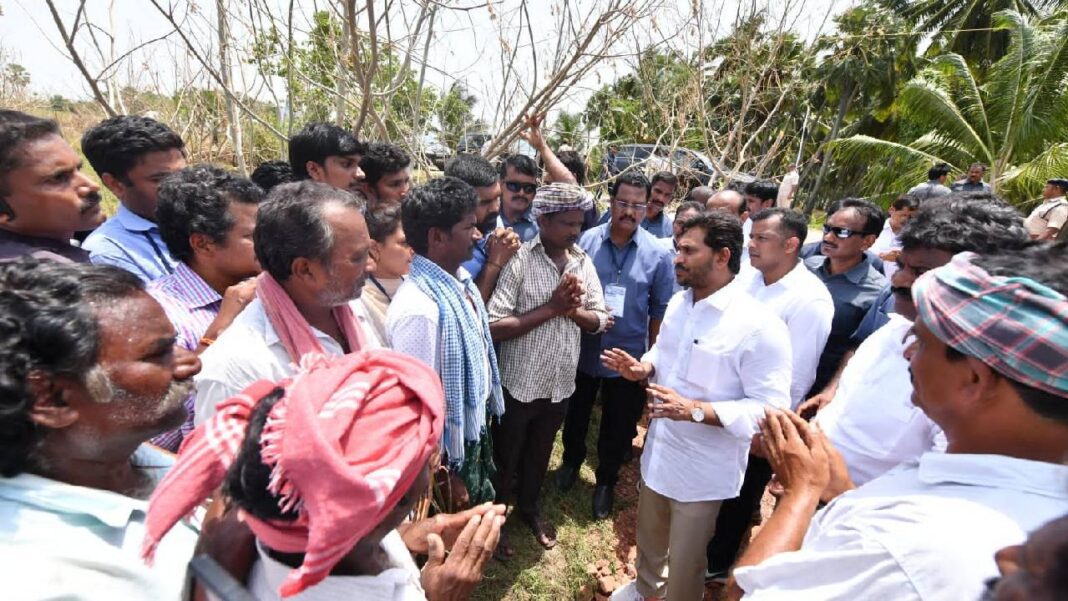-Interacts with flood-affected villagers, takes their feedback
-In Mummidivaram mandal, the Chief Minister visited Gurajapulanka, Kuna Lanka, and Thanelanka villages, while in P. Gannavaram mandal, he interacted with the residents of Kondakuduru Lanka and Potti Lanka villages
-Villagers expressed satisfaction with the prompt supply of groceries and the efficient distribution of cash compensation, overseen by government officials
-The Chief Minister directed officials in specific villages to address pension-related concerns and facilitate self-employment opportunities for women -Schoolchildren’s groups highlighted the timely receipt of ‘Vidya Kanuka’ and ‘Vasathi Deevena’ benefits.
PNS n Vijayawada
Continuing his tour of flood-affected districts, Chief Minister YS Jagan Mohan Reddy undertook a comprehensive visit to various low-lying villages within Mummidivaram and P. Gannavaram mandals of the Dr. Ambedkar Konaseema district on Tuesday. During his visit, he engaged with local residents and gained firsthand insights into the challenges they are facing.
In Mummidivaram mandal, the Chief Minister visited Gurajapulanka, Kuna Lanka, and Thanelanka villages, while in P. Gannavaram mandal, he interacted with the residents of Kondakuduru Lanka and Potti Lanka villages. Taking a proactive approach, he personally toured homes, spoke with villagers at their doorsteps, and inquired about their well-being. His interactions extended to group discussions within the villages.
The Chief Minister took the opportunity to address written appeals from the villagers. He dedicated time to discussing flood relief measures, the distribution of groceries, and the disbursement of cash compensation. Villagers expressed satisfaction with the prompt supply of groceries and the efficient distribution of cash compensation, overseen by government officials.
As part of the assistance, affected households reported receiving compensation of Rs 2,000 for properties inundated by floodwaters and Rs 10,000 for houses that suffered damages, in addition to essential provisions. During these interactions, the residents commended the dedicated efforts of official teams, emphasizing their timely and effective response to relief requirements.
Expressing his contentment, the Chief Minister noted the absence of grievances from the villagers. He took the occasion to announce the authorisation of funds for the construction of a 3.5 km long revetment wall (stone pitching) along the Godavari River in flood-prone villages. This initiative aims to curtail soil erosion and will be allocated Rs. 200 crore in funding.
In a further demonstration of his commitment, the Chief Minister examined the markings made by officials to assess floodwater levels from previous and current seasons. He also surveyed the impact on crops, including chili, ladies’ fingers, and other vegetables, engaging in discussions with affected farmers and pledging support.
Comparing the administrations’ actions, the Chief Minister emphasised the contrast between past and present governments in terms of flood relief efforts and welfare scheme implementation. He received consistent feedback from the villagers about the punctual delivery of welfare benefits, including pensions.
Responding to local needs, the Chief Minister directed officials in specific villages to address pension-related concerns and facilitate self-employment opportunities for women. Schoolchildren’s groups highlighted the timely receipt of ‘Vidya Kanuka’ and ‘Vasathi Deevena’ benefits.
Assuring farmers, the Chief Minister declared the imminent commencement of crop loss assessment, set to begin within the next three days. He confirmed that compensation for crop losses would be disbursed by the end of the month. To ensure transparency, detailed lists of crop loss data will be displayed at Rural Block Kendras (RBKs), allowing residents to voice grievances if necessary. He reaffirmed the commitment to uphold justice for all eligible individuals through a comprehensive social audit.
Highlighting a unique initiative, the Chief Minister underscored the government’s efforts to vaccinate affected cattle. He praised the cohesive administrative setup, comprising RBKs, Village Clinics, volunteers, and secretariat staff, for their swift and organised response in providing aid to flood-affected communities.




